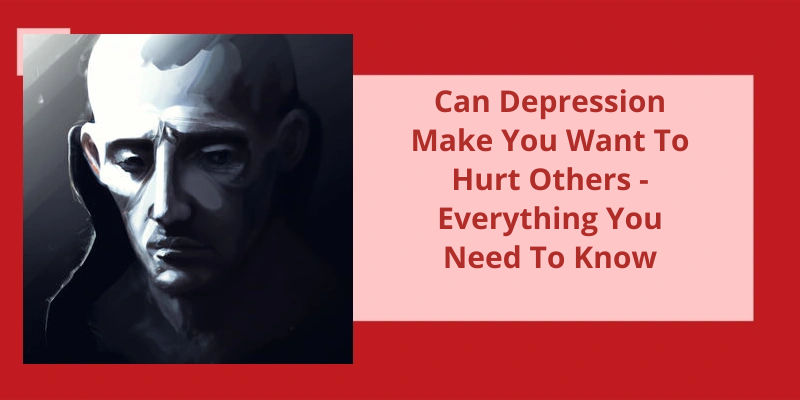Can Depression Make You Want to Hurt Others – Everything You Need to Know. While it’s widely recognized that individuals experiencing depression often bear the burden of their emotional turmoil internally, a lesser-known aspect of this condition involves the potential for harmful outward projections. Notably, depression can give rise to a range of negative emotions such as disgruntlement, resentment, and irritability, which can, in turn, provoke an alarming desire to harm others. This inclination towards violence tends to be more prevalent in individuals who’re predisposed to such behavior and becomes particularly pronounced when faced with severe frustration. Understanding the complexities of depression and it’s potential consequences is crucial in order to address the needs of those living with this condition and provide appropriate support and intervention.
Can Depression Make You Abusive?
Depression is a complex mental health condition that affects individuals in various ways, both psychologically and behaviorally. While it’s essential to recognize that not everyone with depression becomes abusive, it’s important to address the potential correlation between depression and abusive behavior. The experience and reaction to depression can differ significantly from one person to another.
Among those struggling with depression, some individuals may manifest their internal struggles through physical or verbal abuse towards others. This aggressive behavior serves as an outlet for their emotional pain, allowing them to momentarily escape from their distress. Anger and frustration can build up due to the overwhelming feelings of sadness, hopelessness, and isolation associated with depression, leading to outbursts directed at loved ones.
Alternatively, some individuals with depression may exhibit agitation or engage in reckless behavior as a means of coping with their emotional turmoil. The intense emotional upheaval experienced during depressive episodes can provoke impulsive actions, which may include taking risks or engaging in dangerous activities. These behaviors can serve as a temporary distraction and a method of numbing their emotional pain.
For some individuals, depression can lead to self-destructive behaviors, such as excessive alcohol consumption or drug abuse. This form of self-medication provides a temporary escape from the overwhelming feelings of emptiness and despair. Substance abuse becomes a way to numb their emotional pain temporarily, even though it may exacerbate the negative effects of depression in the long run.
It’s important to note that these behavioral reactions to depression aren’t universal and can vary from person to person. Each individuals response to depression is influenced by a combination of factors, including their personal experiences, coping mechanisms, and support systems. It’s crucial to approach each case with empathy and understanding, recognizing that abusive or self-destructive behaviors are symptoms of underlying mental health issues that require professional intervention and support.
Seeking therapy or counseling can provide individuals with the necessary tools and coping strategies to manage their depression in healthier ways. By addressing the root causes of their emotional distress, individuals can work towards breaking the cycle of abusive behavior and develop healthier ways to navigate their depression.
When individuals experience depression, they often find themselves grappling with a complex range of emotions that can prove overwhelming. This emotional burden can inadvertently lead some people to direct their anger and frustration towards loved ones or those in their immediate surroundings. With depression intensifying negative emotions and impeding self-control, such individuals may later regret their behavior, creating a cyclical pattern that can be challenging to break free from.
Why Do People Get Mean When They Are Depressed?
Depression is a complex mental health condition that affects individuals in various ways. While it’s known to primarily cause feelings of sadness, hopelessness, and loneliness, it can also lead to a range of other emotions, including anger. However, it’s important to note that not all individuals with depression experience anger, and those who do may not necessarily direct it towards others.
Moreover, depression often leads to feelings of personal inadequacy and self-blame. Individuals may become trapped in a negative cycle of self-criticism and self-loathing, which can further fuel their anger towards both themselves and others. In some cases, a person may also direct their anger outward as a defense mechanism, attempting to protect themselves from the perceived judgments or criticism of others.
It’s crucial to remember that this anger doesn’t define the persons true character. Individuals who lash out while depressed are often in immense pain and are struggling to cope with their emotions. It’s important to approach them with empathy, understanding, and support, rather than condemning their behavior. Seeking professional help, such as therapy or counseling, can provide individuals with the necessary tools and strategies to manage their emotions effectively and reduce the likelihood of hurting themselves or others.
Research has shown that individuals who experience depression often exhibit normal or heightened levels of empathy. However, their ability to accurately interpret and respond to others’ pain may be impaired due to distorted thought patterns. Instead of attributing the cause of suffering to external factors, depressed individuals tend to assign blame internally, typically directed towards themselves. This nuanced aspect of empathy in depression sheds light on the complex interplay between mental health and the perception of others’ emotions.
Are Depressed People More Empathetic?
Depression is a debilitating mental health condition that affects millions of individuals worldwide. While it’s commonly known for it’s impact on ones own mental well-being, it’s effects on interpersonal dynamics and empathy are often overlooked. Contrary to popular belief, individuals who’re depressed can possess normal or even heightened levels of empathy.
Empathy, the ability to understand and share the feelings of others, is an intricate aspect of human connections. Depressed individuals may genuinely sympathize with the pain experienced by others, displaying compassion and understanding. However, their interpretation of these emotions can be influenced by their own distorted perception of reality.
One hallmark characteristic of depression is a distorted sense of self-blame. Consequently, individuals with depression often subconsciously direct blame towards themselves when perceiving the pain of others. This non-conscious assertion of blame can lead them to internalize and personalize the suffering they observe, which may exacerbate their depressive symptoms.
Depression, a nuanced and complex mental health condition, can manifest in various ways, often leading to unexpected behavioral patterns. Hidden depression, in particular, can elicit personality changes that may seem perplexing to those who’re unaware of it’s impact. These alterations range from increased reticence and withdrawal to uncharacteristic outbursts of anger and irritability. Although anger and irritability aren’t commonly associated with depression, they’re prevalent among individuals dealing with this insidious condition. Understanding these mood changes can help shed light on the intricate nature of depression and it’s effects on behavior.
Can Depression Make You Act Strange?
Depression is a complex and multifaceted mental health condition that can manifest in various ways, even causing individuals to act strangely. While sadness and a loss of interest in activities are commonly associated with depression, some people with hidden depression undergo significant personality changes. This alteration can take place on two distinct ends of the spectrum.
One possible manifestation is that individuals become more withdrawn and quiet. They may isolate themselves from social interactions, preferring solitude instead. Communication can become minimal, and they may struggle to express their emotions or engage in meaningful conversations. This withdrawal and silence may be misconstrued as aloofness or disinterest, further isolating the individual from potential support systems.
On the other hand, depression can also trigger anger and irritability. These mood changes may surprise those unfamiliar with the relationship between these emotions and depression. Individuals who experience this aspect of depression may become easily agitated, display a short fuse, and have difficulty managing their anger. They might lash out at others or engage in verbal or even physical confrontations. This behavior can strain relationships and further exacerbate their depressive symptoms.
This connection between depression and anger is essential to understand, as it serves as a reminder that depression isn’t solely characterized by sadness but can manifest in a myriad of ways. It’s important to recognize and validate these mood changes, as they may be indicative of underlying depression. Seeking professional help and support is crucial to address these emotions and manage them effectively.
Furthermore, it’s essential to remember that not everyone with depression will experience these personality changes. Each individuals experience with depression is unique, and symptoms can vary widely. However, recognizing the potential for behavioral shifts is vital in order to foster empathy and understanding towards individuals whose depression may manifest in unconventional ways. Ultimately, by providing support and resources, we can help those with hidden depression navigate their emotions and prevent potential harm to themselves or others.
Depression is a complex mental health condition that encompasses a range of symptoms and is often accompanied by various behavioral changes. One aspect that’s been observed in individuals with depression is impulsivity, which can lead to aggressive behavior. Studies have shown a positive correlation between impulsivity and aggression in depressed individuals, highlighting the potential link between the two. Understanding the connection between depression, impulsivity, and aggression can provide valuable insights into managing and treating these challenging symptoms.
Can Depression Make a Person Aggressive?
Depression, often characterized by a persistent feeling of sadness and hopelessness, can manifest in various ways. While it’s commonly known that individuals with depression often experience self-destructive thoughts and behaviors, it’s essential to understand that this mental health condition can also lead to aggression towards others. Impulsivity, a common trait found in depressed individuals, has been closely associated with aggressive behavior.
The underlying reasons for this connection are multifaceted and complex, involving a combination of biological, psychological, and social factors.
One possible explanation for the connection between depression and aggression lies in the disrupted neurotransmitter balance that’s often observed in depressed individuals. When serotonin levels are low, individuals may be more prone to act impulsively and engage in aggressive behaviors.
Feelings of frustration, irritability, and anger are commonly experienced by individuals with depression. These intense emotions, coupled with a sense of hopelessness, may contribute to a heightened likelihood of lashing out at others.
Social isolation and a lack of support networks can exacerbate feelings of anger and hostility, leading to an increased risk of harming others. Additionally, the stigma surrounding mental health can further isolate individuals, deepening their feelings of anger and potentially leading to aggressive behavior as a maladaptive coping mechanism.
The Impact of Gender on the Expression of Aggression in Individuals With Depression
- Research studies have shown that there’s a significant impact of gender on the expression of aggression in individuals with depression.
- It’s been observed that men with depression tend to display more physical aggression compared to women with depression.
- This gender difference in aggression expression may be influenced by various factors, including societal expectations, hormonal differences, and socialization processes.
- Women with depression, on the other hand, are more likely to exhibit relational aggression, such as gossiping or spreading rumors, as a form of expressing their aggression.
- Psychological studies have suggested that these gender differences in aggression expression may be attributed to biological, psychological, and social factors.
- Understanding these gender differences is crucial for developing effective intervention strategies for individuals with depression, as it can help tailor treatment approaches according to their specific needs.
- Additionally, considering the impact of gender on aggression expression can contribute to a better understanding of the overall dynamics of aggression in individuals with depression.
Conclusion
In conclusion, it’s crucial to understand that depression isn’t limited to feelings of sadness alone. By raising awareness about the complex interactions between depression, anger, and violence, we can foster understanding, support, and effective interventions for those in need.






